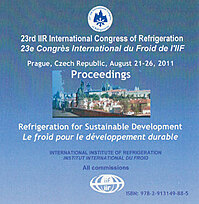
Document IIF
Analyse numérique de l'influence des différentes stratégies de régulation sur la performance saisonnière d'une pompe à chaleur air-eau.
Numerical analysis of the influence of different control strategies on the seasonal performance of an air-to-water heat pump.
Numéro : pap. ID: 168
Auteurs : MOLINAROLI L., BIANCHI C., MAGNI F., et al.
Résumé
The paper illustrates the results of a numerical study carried out to investigate the influence of different heating capacity control strategies on the seasonal performance of an air-to-water heat pump. The analysis is carried out through a dynamic mathematical model of the system composed by the heat pump, the radiant heating floor and the house and considering three different control strategies of the heating capacity supplied by the heat pump and two control strategies of the temperature of the water leaving the heat pump. Simulations are carried out both in the scenario where the heat pump is used only for heating purpose and where the heat pump is used also for tap hot water production. The results allow to state that the heat pump control strategy strongly influences its seasonal performance and, with an optimal choice, it is possible to achieve higher seasonal COP and to reduce indoor air temperature and floor temperature fluctuations.
Documents disponibles
Format PDF
Pages : 8 p.
Disponible
Prix public
20 €
Prix membre*
Gratuit
* meilleur tarif applicable selon le type d'adhésion (voir le détail des avantages des adhésions individuelles et collectives)
Détails
- Titre original : Numerical analysis of the influence of different control strategies on the seasonal performance of an air-to-water heat pump.
- Identifiant de la fiche : 30001593
- Langues : Anglais
- Source : Proceedings of the 23rd IIR International Congress of Refrigeration: Prague, Czech Republic, August 21-26, 2011. Overarching theme: Refrigeration for Sustainable Development.
- Date d'édition : 21/08/2011
Liens
Voir d'autres communications du même compte rendu (569)
Voir le compte rendu de la conférence
Indexation
-
Adaptive supply temperature control for domesti...
- Auteurs : HUCHTEMANN K., STREBLOW R., MÜLLER D.
- Date : 16/06/2013
- Langues : Anglais
- Source : Clima 2013. 11th REHVA World Congress and 8th International Conference on Indoor Air Quality, Ventilation and Energy Conservation in Buildings.
- Formats : PDF
Voir la fiche
-
Development and experimental validation of mode...
- Auteurs : GOBEL S., FIEDLER T., KLINGEBIEL J., VERING C., MÜLLER D.
- Date : 13/06/2022
- Langues : Anglais
- Source : 15th IIR-Gustav Lorentzen Conference on Natural Refrigerants (GL2022). Proceedings. Trondheim, Norway, June 13-15th 2022.
- Formats : PDF
Voir la fiche
-
Small ammonia heat pump with variable speed com...
- Auteurs : MONFARED B. A., PALM B.
- Date : 25/06/2012
- Langues : Anglais
- Source : 10th IIR-Gustav Lorentzen Conference on Natural Working Fluids (GL2012). Proceedings. Delft, The Netherlands, June 25-27, 2012.
- Formats : PDF
Voir la fiche
-
Numerical comparison of several control strateg...
- Auteurs : ILLÁN GÓMEZ F., SENA CUEVAS V., GARCIA CASCALES J. R., SÁNCHEZ-VELASCO F. J.
- Date : 11/11/2020
- Langues : Anglais
- Source : X Congreso Ibérico y VIII Congreso Iberoamericano de Ciencias y Técnicas del Frío, CYTEF 2020.
- Formats : PDF
Voir la fiche
-
Tool for SPF determination of air-to-air and ai...
- Auteurs : DUMONT E., SKRYLNYK A., FRERE M.
- Date : 21/08/2011
- Langues : Anglais
- Source : Proceedings of the 23rd IIR International Congress of Refrigeration: Prague, Czech Republic, August 21-26, 2011. Overarching theme: Refrigeration for Sustainable Development.
- Formats : PDF
Voir la fiche
